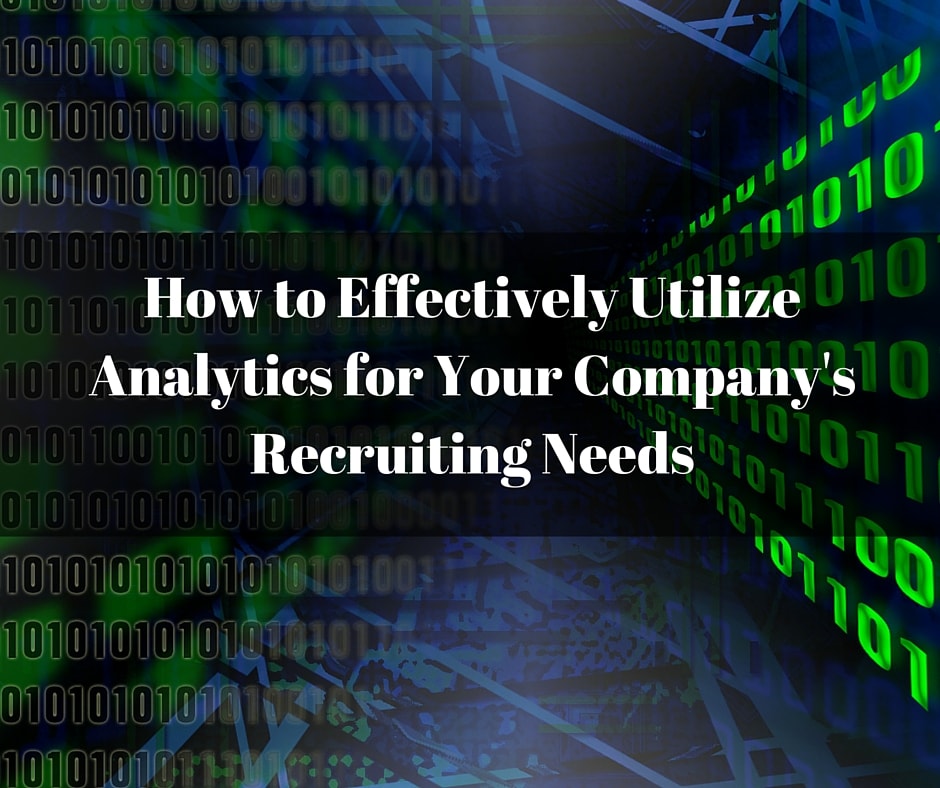How to Effectively Utilize Analytics for Your Company’s Recruiting Needs
Hiring has never been more difficult. Recruiters are having a terrible time finding qualified skilled talent to fill their endless open positions. Job seekers feel that their online applications go into a resume black hole and they don’t hear from anyone. They forget that Recruiters are trying to ensure that a candidate is the best fit for both the role and organization. Recruiters forget that candidates are assessing the viability of the employer as well as the career growth potential of the role.
More data isn’t necessarily helping employers fill their jobs, mostly because many employers ignore the best data out there – talent intelligence. As in, what is the available pool of qualified talent in the local market? Many organizations forget to include a comprehensive analysis on whether they can even obtain or have access to the right talent before they begin a new venture. With the increased use in analytics, I constantly see employers focused on using assessments designed to eliminate almost all of their candidates, not understanding that they can’t afford the very candidates they want.
If Google does it, it has to be good, right?
Testing and assessments are back in a big way. Interview scoring, legally controversial, fell out of favor in the 80s. Denying employment based on a cut off that has not been validated to predict performance is potentially very discriminatory, particularly if it results in a higher rejection rate for some groups over others. However, not a month goes by where I don’t see an article advocating the use of interview scoring and other types of non validated data to determine whether a candidate is the best match for a job. Google does it. So it should be ok, right?
If you are an executive running your company, keep in mind that what works for Google may not work for you, unless you are able to prove that the given technique is reliable, predictive, and legally defensive. On top of that, candidates can go on Glassdoor and Indeed to rate your entire interview and assessment system. If they feel that an assessment does not have “face validity,” meaning the assessment doesn’t seem related to job performance, they can anonymously self publish their critique online and affect your recruitment for years.
At the core of analytics is analyzing how data points form patterns. However, your selection process must be predictive, reliable and legally defensible. For instance, a finance company may hire an IO Psychologist who determines that factors other than GPA correlate more strongly to success in the first year of employment, while an insurance company might confirm that GPA isn’t really linked to top performance. That same insurance company might notice that success is actually more reflective of attention to detail on application forms or whether candidates had previous experience in sales and business development- even selling real estate or cars.
These are all good patterns to recognize, but they must be validated. Notice how deciding on a hard metric like GPA – as did Google at one point – can actually undermine a company’s hiring practices. FYI…GPA is a predictor of first year work performance for recent grads, but dramatically drops in predictiveness with more experienced hires. By focusing on numbers over character, experience, and compatibility, companies run the risk of decreasing the potential pool of qualified talent.
If, then…
Data and analytics are most effective when companies use them to determine the relevant pool of qualified talent in the relevant geography for sourcing the role. If you want to use data and analytics around your actual interview and assessment process, remember that:
- All components of your selection process must be predictive, reliable and legally defensible. Before you let a rogue Hiring Manager score an interview and create a non validated cutoff score, think back to the biased firefighters’ tests of the 70s and even several years ago
- If you eliminate all but superstars, are you willing to pay at the top of the market to hire and keep them?
- Recruiting is an art and a science. Candidates are more than just data points.
- Back to your budget. Are you really willing to pay at the top of the market?
- Can you keep this hire happy? Research indicates when top performers quit, they aren’t quitting your company. They are quitting their manager.
What’s Your Compensation Strategy?
Cost of living is skyrocketing in many markets that were formerly affordable. These insane housing costs are changing how talent behaves, out of necessity. If you determine you want only “top” talent…why? And what is that?
Instead of trying to figure out who the best candidate is, try to figure out where the best candidates are and if your company is even in the ballpark when it comes to compensation to try to poach them. Because I can promise this…they are already working. So if you are going to try to hire passive job seekers, get ready to give big increases and titles and blow up your comp plan. First and foremost think where is the pool of qualified talent and are we even willing to pay them what it would take to get them?
Be careful about top grading and aggressive assessment techniques that may not work for a company that is in the middle when it comes to pay or even worse, below market on comp. Recruiting data and analytics is valuable. But when it comes to candidate assessment, companies must exercise caution.

